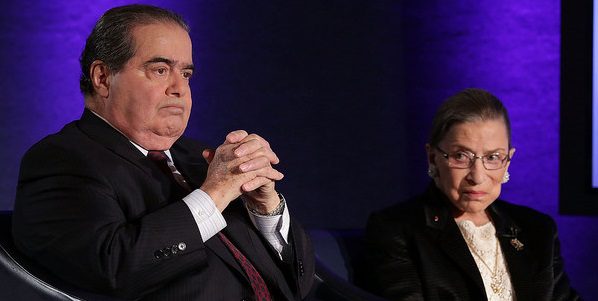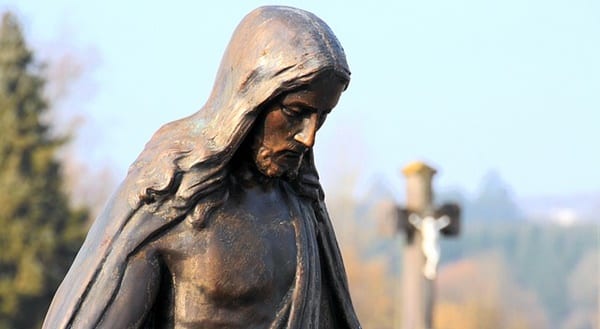 In the wake of Supreme Court Justice Antonin Scalia death last Saturday, I’d like to put politics aside for a moment and talk about friendship. That’s because if anything good came from his untimely death, it is the fact that we are learning about his friendship with Ruth Bader Ginsburg. It is a friendship that gives me hope.
In the wake of Supreme Court Justice Antonin Scalia death last Saturday, I’d like to put politics aside for a moment and talk about friendship. That’s because if anything good came from his untimely death, it is the fact that we are learning about his friendship with Ruth Bader Ginsburg. It is a friendship that gives me hope.
But before I tell you about that hope, I’m going to confess to you my resentment. Deep down, I’m scandalized by their friendship. I mean, as a progressive I’m left wondering, How could she do that? How could Ginsburg be friends with him? In fact, she says they weren’t just friends; they were “best buddies.” BFFS with him!
This just isn’t right. I mean, they aren’t supposed to be best buddies. In our politically divisive climate, they are supposed to be worst enemies!
Besides, doesn’t Ginsburg know that Scalia stood for everything we Progressives are against? He seemingly compared the morality of homosexual conduct to the morality of polygamy, cruelty to animals, and even murder. He didn’t “want to have to deal with global warming.” He defended torture. He said the Constitution doesn’t protect women’s rights. And he suggested that black people should go to slower colleges.
And here’s Ginsburg, our Progressive hero, crossing the political divide to befriend Scalia. The two vacationed together, spent New Year’s together, and went to the opera together. The gall! Doesn’t she know that we Progressives need to stick together? And one way that we stick together is to unite against a common enemy. Hatred against a scapegoat is the glue that so often unites us.
So I confess to you that I feel some resentment toward Ginsburg. And, after hearing the news of this unlikely friendship, I’m sure that many conservatives are feeling something similar toward Scalia. That’s because group identity is so often formed by uniting against the same enemy. James Alison puts it like this,
Give people a common enemy, and you’ll give them a common identity. Deprive them of an enemy, and you will deprive them of the crutch by which they know who they are.
This is the default way of forming human identity. For example, we progressives know who we are because we have the same scapegoats – those conservatives! But the same is true for conservatives. They know who they are because they have the same scapegoats – those liberal progressives!
This may be the default way of forming identity, but it’s not the way we have to form identity. Scalia’s friendship with Ginsburg shows us the alternative. They passionately disagreed on almost everything. But their friendship points us beyond even our most severe disagreements toward something bigger – the love of friendship.
Jesus called his followers to love everyone, including our enemies. It’s a love that’s not based on primarily on positive emotions for another. Rather, it’s based on actively reaching out toward the other. It refuses to join our own group in uniting in hatred against a scapegoat. It’s a love that can disagree with the other, but it also loves the other as the other is. In other words, love doesn’t seek to change the other to conform to our views. It just loves the other and seeks friendship with the other.
But make no mistake, to become friends with our group’s scapegoat is risky business. It takes great courage because in becoming friends with a scapegoat, our group will likely be scandalized. Cross over the hatred that divides “us” from “them,” our group may become resentful as its identity is challenged. It will feel like “the crutch by which they know who they are” is being taken away. And what does a group do when its identity is challenged? It reinforces its identity by uniting against another common enemy, in this case, the one who broke ranks with us by becoming friends with the other. What a traitor!
But friendship that risks crossing the divide of hostility is the hope the Scalia and Ginsburg give us. It’s the hope of Christ who calls us to love all people, just as they are. People are not objects to be converted to our cause; they are humans deserving of love and friendship. If we take that message seriously, we will remove the crutch of scapegoating. We will cross the border of group identity formed in opposition to the other. Instead, we will seek ways to intentionally form friendships with the other. And when we do, we will risk scandalizing our group.
But that’s okay, because we know that love and friendship that crosses over the barriers of scapegoating is exactly what the world needs at this very moment.
Image: Flickr, Leven Ramishvili, Antonin Scalia and Ruth Bader Ginsburg at the National Press Club in Washington D.C., April 17, 2014, Creative Commons Copyright, Public Domain Mark 1.
Stay in the loop! Like Teaching Nonviolent Atonement on Facebook!











